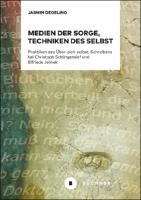Medien der Sorge, Techniken des Selbst
Praktiken des Über-sich-selbst-Schreibens bei Schlingensief und Jelinek
Abstract
Can art heal? Jasmin Degeling pursues this question via a redefinition of Michel Foucault’s concepts of the technologies of the self as well as of care of the self through the lenses of media studies. For that purpose she describes and analyzes the media and aesthetics of Christoph Schlingensief and Elfriede Jelinek as aesthetic therapeutics. The example of the later works of theater, film, and action artist Christoph Schlingensief traces the modern political and aesthetic history of art as a medium of therapeutics, while Elfriede Jelinek’s monumental online novel »Neid (Mein Abfall von allem) – Ein Privatroman« experiments with literary writing in virtual spaces and designs an autobiographical novel that rejects any form of literary subject constitution in a feminist way. The study brings contemporary media of care into view as exercises in healing, health, and survival, and connects them to an archaeology of the aesthetic and media history of modern concepts of health and healing. Kann Kunst heilen? Dieser Frage geht Jasmin Degeling mittels einer medienwissenschaftlichen Neubestimmung von Michel Foucaults Konzepten der Techniken des Selbst sowie der Sorge um sich nach und analysiert die Medien und Ästhetiken von Christoph Schlingensief und Elfriede Jelinek als ästhetische Therapeutiken. Am Beispiel der späteren Arbeiten des Theater-, Film- und Aktionskünstlers Christoph Schlingensief zeichnet sich die moderne politische und ästhetische Geschichte von Kunst als Medium der Therapeutik ab: Der Wunsch nach einer Gesundheit des Denkens, Empfindens wie Lebens verschränkt sich dabei mit der biopolitischen Geschichte moderner, ästhetischer Heilsprogramme. Schlingensiefs Versuch, sich selbst zu heilen, schreibt sich in einen Komplex von Kunstreligion, modernem Vitalismus und Kolonialgeschichte ein. Elfriede Jelineks monumentaler Onlineroman »Neid (Mein Abfall von allem) – Ein Privatroman« experimentiert mit literarischem Schreiben in virtuellen Räumen und entwirft einen autobiographischen Roman, der jeder Form literarischer Subjektkonstitution eine feministische Absage erteilt. Diese Poetik erweist sich als Programm einer spezifisch modernen Sorge um sich: Medientechnisch ermöglicht durch das Heilsversprechen eines von der Realwelt abgetrennten Cyberspace, übt Jelinek im Format des frühen Onlinetagebuchs eine digitale Askese in virtueller Unendlichkeit, Leere und Weite und gibt so Raum für eine komplexe poetische Reflexion des Verhältnisses von Medien, Empfindung und Subjektivierung. Die Studie rückt zeitgenössische Medien der Sorge als Übungen der Heilung, der Gesundheit und des Überlebens in den Blick, und verbindet diese mit einer Archäologie der ästhetischen und medialen Geschichte moderner Konzepte von Gesundheit und Heilung.
Keywords
Christoph Schlingensief; Elfriede Jelinek; Michel Foucault; Joseph Beuys; Gender Studies; Queer Studies; biopolitics; performativity; self-care; mediality; subjectifyingDOI
10.14631/978-3-96317-776-7ISBN
9783963177767, 9783963172380, 9783963177767Publisher
Büchner-VerlagPublication date and place
Marburg, 2021Classification
Media studies
Performance art
Individual actors and performers


 Download
Download Web Shop
Web Shop